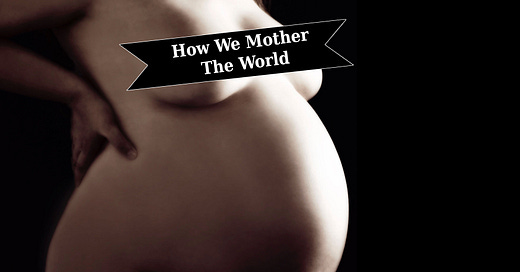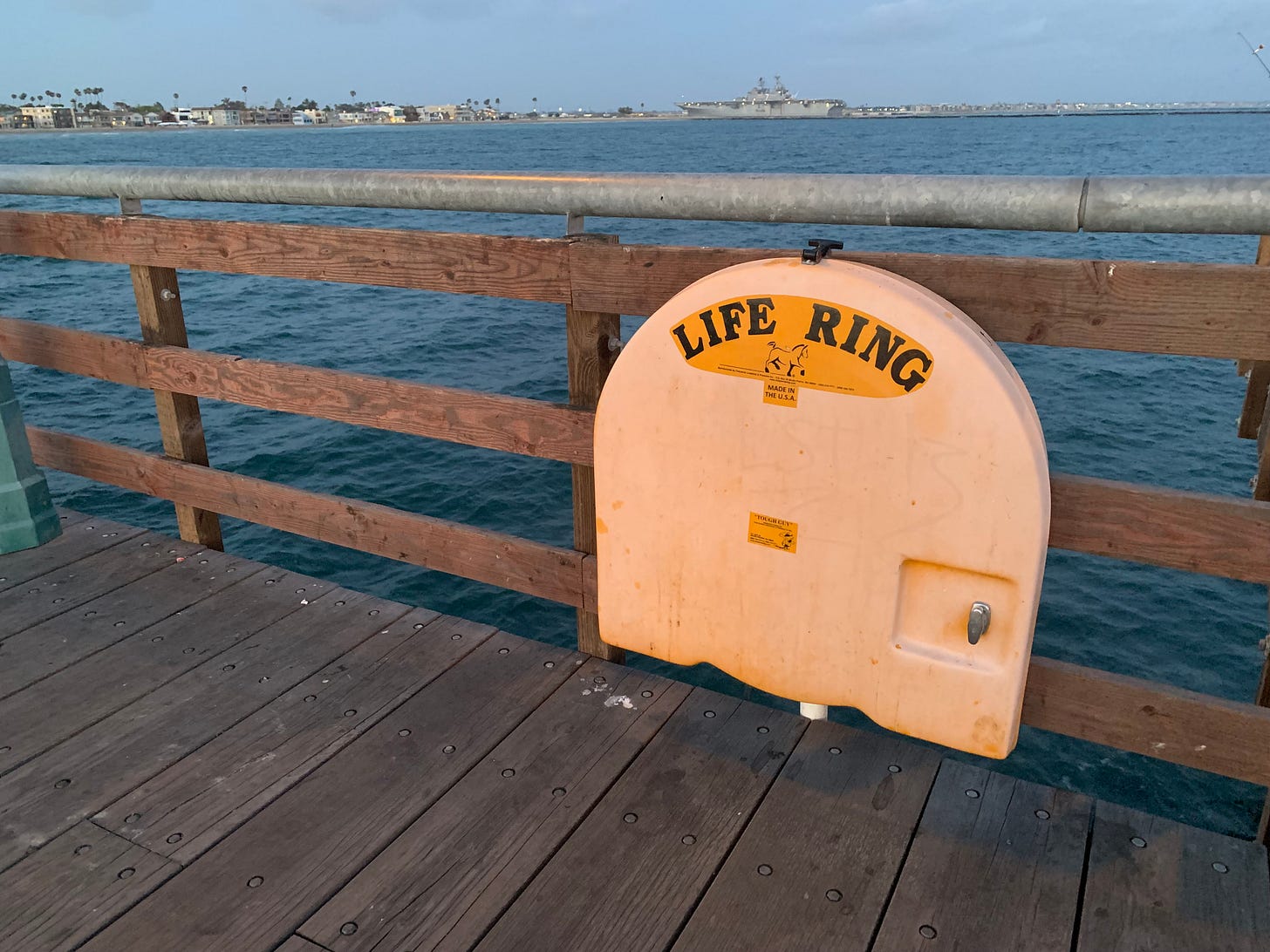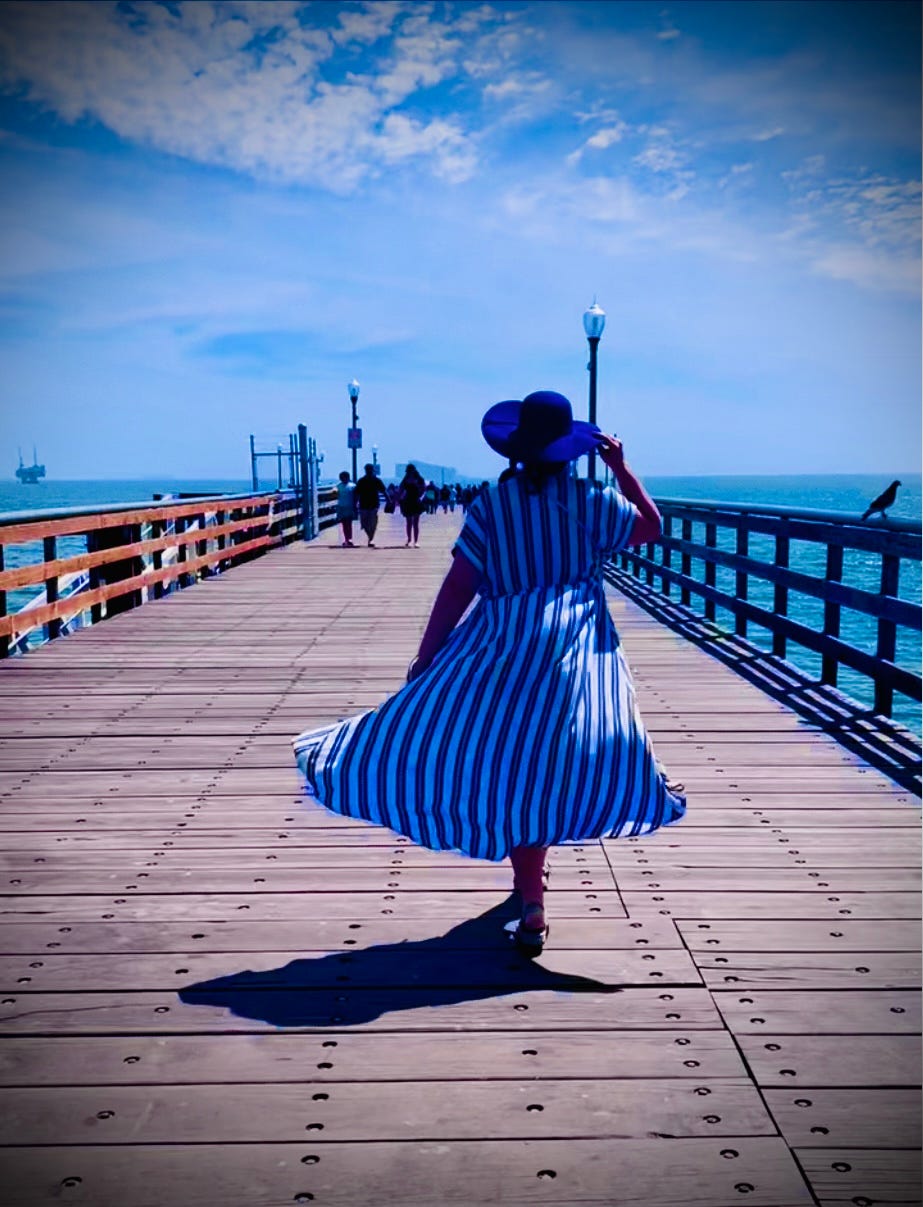Photo Description: A sepia tone image of Sage Justice stands nude and pregnant in a profile photo taken many years ago now being used in a series about mothering the world through acts of righteousness.
Here are two incidents of righteousness that helped save the lives of strangers and illustrated to me the importance of listening to our intuition and being brave enough to mother the world:
The Boy On the Escalator, Incident One
“Turn around, now!”
It was that voice within that’s been with me since before I was born, the voice of my intuition. This command had a tone of urgency. It came with a sense of electricity that started in my toes and quickly shot all the way up my spine and out through the top of my head. This jolt of energy gifted me strength, and courage.
As I turned around, I saw a child, maybe five years old, who had just stepped on the escalator heading up toward his mother, who I could see waving to him on the second floor. My intuition guided my eyes to his right foot. His shoelaces were caught in the side wall of the escalator, and this metal beast of moving stairs was chomping on the shoe with the boy’s foot still in it.
I was pushing my daughter in her stroller and didn’t even have time to set the brakes. I let go of my baby to save someone else’s baby. I darted over to the child and pulled him up and out of his shoe, just in the nick of time before the escalator devoured it.
The boy was crying and reaching for the gnashing teeth of steel that ate his shoe. His mother started screaming in a foreign language. She was too far away to see what happened to his shoe. All she could see was a strange woman who had her child and was carrying him to a stroller that had drifted away, while her son cried and reached for what looked like his mother.
As the boy’s mother rushed toward us, I was trying to explain what happened. I quickly realized with the language barrier and physical distance that it was best to stop, breathe, and relax. I had my hands full simply trying to hold tight to the squirming little boy, and the stroller with my daughter in it who was now crying too.
Adrenalin washed over my body. Gratitude counterbalanced it to help ground me. I gave thanks that my daughter was safe, that this stranger was safe, and hoped I too would be safe when the boy’s mother reached me as she was racing down the escalator towards us.
As soon as she landed on our floor, I set the little boy down; and he ran toward his mother’s opened arms, all the while telling her about the machine that took his shoe. We sort of bowed to each other. As the mall police arrived and shut down the escalator, the mother and her son scurried off. Onlookers surrounded me asking questions, “What happened?” Some people patted me on the shoulder and offered praise, “You saved his life.” I replied, “Well, at least his foot.”
Someone offered to buy me something from the food court so that I might sit and recover from that moment. However, the same intuitive voice that told me to linger in the mall, that put me in the right place at the right time to help a stranger in need, that voice that told me to turn around when I did was also now telling me to get home as soon as possible, because whenever I have these experiences, a crash of fatigue often comes next.
I was being flooded not by feelings of pride, but of guilt for letting go of my child to help another. Even though she was fine, the fear of what could have happened to her began to haunt me. It’s the fear of what could happen that prevents people from helping; and it’s faith that allows those who are brave to push through the fear and help anyway.
The Teen Who Nearly Drowned, Incident Two
A week or so before the near drowning occurred, my foot suddenly started feeling as if it was stepping in water whenever I walked on the pier. It was January 19, 2025. I felt a sense of impending doom. We in Southern California were nearing the end of the most dangerous fires we’d ever experienced. The air by Long Beach was finally clear enough to breathe. We were hours away from the inauguration of Donald Trump as the 47th president of the United States, and something in the core of my soul was telling me that life as we knew it was about to change forever.
I didn’t know if I was having this sensation of stepping in water because we were going to experience another environmental disaster, like a tsunami, or if I was having another stroke, or if this was my intuition preparing me for an event that would require me to be hyperaware. (It was the latter.) I received the message through a series of pictures and emotions that I was going to be in a situation involving drowning, and that this was my warning to be vigilant.
On the night that it happened, I was with my husband and daughter. They had stopped to use the restrooms; and we agreed to meet on the pier, so I began to walk ahead. I arrived to hear the splashes of three teen boys, who had just jumped into the ocean. The sensation of stepping into puddles returned. Now, it was both of my feet and rapidly climbing up my legs.
I leaned over the rails and noticed the boys were in danger. I yelled, “You’re in a riptide. Get away from the pier.” One teen listened to me and immediately started swimming parallel to the shoreline, until he broke free from the riptide, turned toward the beach and quickly reached the shore. The second teen was a stronger swimmer and more defiant. I could tell he was going to try and swim against it. The third teen was clueless and had no idea the danger he was in. He yelled back to me, “Chill out, lady!” That’s when all the lookie-loos’ phones came out.
My intuitive voice said, “Go check to see if the life preserver is at the end of the pier where it’s supposed to be and unlock the box.” As I was walking, I could hear banter between the boys and their fatigue setting in. One teen said, “I can’t swim past this point, the current is too strong.” The other teen responded, “Try to hold on to the wall.” Which was dangerous, near impossible, and would have covered his skin in abrasions, after the first wave hit, had he done so. I knew they didn’t have much time before their arms would be too tired to keep trying.
Just as I turned to start heading back toward them, I saw my husband and daughter and told them what was happening. That’s when the first teen who made it to the shore was now running on the pier toward the life preserver I had just unlocked. I ran to where the teens were. Only one remained left as the other had presumably swam back to the shore. I said, “You need to relax and allow your body to rest to gain the strength you need to get back to shore. Roll onto your back and float until we can get help.” He listened.
His friend (teen one) ran to the edge and successfully threw the life preserver to him. He was holding on to it weakly and I knew it would soon slip away.
I instructed, “You have to put it over your head and hold it near your waist.” He listened.
“Someone call 911!” I yelled.
The woman next to me stopped filming and started calling.
“You’re going to be OK!” my daughter shouted.
The teen responded, “What do I do? How do I get back to the shore?”
We tried to yell instructions to him; but the ocean was roaring, and each wave was pounding his body faster and harder than the one before. “I can’t hear you!” He said.
My husband, with his booming voice, cupped his hands around his mouth and said, “Swim away from the pier and the waves will carry you back to shore.”
The teen said, “What?! I can’t hear you!”
The crowd of people who were filming this child struggling to survive started to put their phones away and joined my family and me in cupping their hands around their mouths, while chanting,
“Swim away from the pier!”
“Swim away from the pier!”
“Swim away from the pier!”
Eventually, he did.
He got about 10 feet from the pier and then said, “Now what do I do?”
I yelled “Let the waves carry you back to the shore!”
He responded with fear and said, “It’s too far.”
I said, “It’s closer than you think! You’re only 20 feet from the sand bar!”
He couldn’t hear me. He started to panic and repeat, “What do I do? What do I do?”
My husband started relaying the instructions I was giving in his deeper voice that carries farther than my own.
Then, the crowd began encouraging him and following my daughter in a chant,
“You can do it! You’re almost there!”
Just then, the ambulances arrived. The teen boy was rescued. My feet stopped feeling like I was walking into a puddle.
How We Mother the World: Acts of Righteousness, an Excerpt from The Righteous 36
“When people hear the word, “righteous” they tend to think of the negative connotation associated with “self-righteousness.”
“Self-righteous is a certainty that one is morally superior. Righteous is the state of being morally right, virtuous. When we confuse the two, we denigrate what is truly righteous for fear of appearing self-righteous. Thus, the anti-hero rises on the mound of buried moral courage.
Righteousness is not a life of perfection. Humans are only perfect in their inherent imperfections. At the core, righteousness is awareness. It is living life with an awakened mindfulness of everyone in the world, versus living a life of sleepwalking apathy and self-focused, reactionary defensiveness.
To be righteous is to live a life of ethical virtue and morality, or more literally, to simply do what’s ‘right.’” – The Righteous 36
Saving the life of a stranger is the act of doing the “right” thing.
The Bystander Effect (as cited in, Sage Words FREEDOM Book One)
“In the 1960s, a phrase was coined by Darley and Latané, called ‘Bystander Apathy,’ to describe when a community takes their cue from the crowd as to whether they should intercede in a situation of injustice. Oftentimes, the difference between a person who has the courage to take a stand and one who seemingly doesn’t is prior knowledge or experience with the type of situation presenting itself. I have personal experience with the situation … presenting itself. Listen to the people around you who have experience and not just personal platitudes. If you’re not the first person to stand, may you have the courage to stand next to the person who does rise, for no one can carry a burden alone.”
Memorial Day, the Rescue that Never Came
It was Memorial Day weekend. My uncle and I were on a sailboat. I was wearing a life jacket, he wasn’t. I had a premonition that we were not safe. I begged to go back to shore, demanded it. We were on a crowded river surrounded by people celebrating the holiday. When he drowned it was in public. People had to have seen him, but no one helped him. It took three days to discover his body.
Please pay attention to your surroundings. Please don’t be a cruel person who uses the privileged and entitled phrase, “It’s not my problem.” Someday, the person most in need will be someone you love with all your heart: a child, a partner, a parent, a friend, and you will long for their problem or suffering to be seen by a perfect stranger, as their own. In the biggest picture, we are one; and the sooner we see other people as we see ourselves and extend our love for family and friends to strangers and all of humanity, the sooner all our needs will be met, and no one will ever have to suffer alone.
Please, listen to people in restaurants who start choking and learn the Heimlich Maneuver. Take a CPR class; a one-day class can save a life. Carry a first-aid kit in your car. Above all, please listen to your intuition. You may not have a relationship with your intuition that is as pronounced as my own (I’ve had these abilities since birth); but the more we listen, the louder and more specific our intuition becomes. It’s never guided me astray.
When We Ask for Help
“Asking for help is difficult for those who pride themselves on being able to do it all on their own. However, I didn’t begin to experience real healing until I got comfortable asking for help. Being able to ask for help is one of the first steps to understanding and believing that we deserve to be helped and are worth being protected from hurt and harm. Allowing others the honor of knowing they have value by being able to help us gives us the opportunity to show gratitude. It also teaches us balance so that we can learn to give as much as we receive and receive as much as we give in order to have healthy relationships based on reciprocity instead of repeating toxic patterns of trauma bonds between givers and takers.” – PTSD: How Trauma Triggers Help Us Heal
We Become the Hero We Needed
Since I was a very small child, I have prayed the prayer, “Please God, speak to me and through me to serve with love.” I needed a hero as a child to protect me from the multitude of abuses I endured. My grandparents and an aunt were heroic figures in my life, as were the parents of some of my friends and my friends themselves. As an adult, my life was saved by homeless people, twice (which you can read about here). I’d love to end this by saying that I became the hero I needed, but that’s only partially true. Instead, I became aware of how much we all need to be heroes to each other: solidarity over charity.
Sage Justice © May 25, 2025 www.SageWords.org This concept/theory/poem is original to Sage Justice. If you use it, please give credit and link to original work. Thank you.
“Train yourself toward solidarity and not charity. You are no one’s savior. You are a mutual partner in the pursuit of freedom.” -Brittany Packett
Photo Image: Sage Justice, wearing a navy and yellow pinstriped duster and purple hat, walks away from the camera on the very pier where the drowning boy was saved. Sage is doing her best to live a life of righteousness without being self-righteous.
Sage Justice is an award-winning poet, author, critically acclaimed performing artist, and intensely sincere, bold humanitarian activist.
If you appreciate this publication, Sage Words, but are unable to afford a subscription, please consider choosing the “Buy Me a Coffee” button when you can. Every little bit helps. Thanks!







Riveting and powerful!
Thank you. I adore who you are. 💕